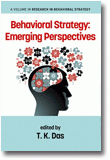
Behavioral Strategy
Emerging Perspectives
Edited by:
T. K. Das, City University of New York
A volume in the series: Research in Behavioral Strategy. Editor(s): T. K. Das, City University of New York.
Published 2014
Behavioral strategy continues to attract increasing research interest within the broader field of strategic management. Research in behavioral strategy has clear scope for development in tandem with such traditional streams of strategy research that involve economics, markets, resources, and technology. The key roles of psychology, organizational behavior, and behavioral decision making in the theory and practice of strategy have yet to be comprehensively grasped. Given that strategic thinking and strategic decision making are importantly concerned with human cognition, human decisions, and human behavior, it makes eminent sense to bring some balance in the strategy field by complementing the extant emphasis on the “objective’ economics-based view with substantive attention to the “subjective” individual-oriented perspective. This calls for more focused inquiries into the role and nature of the individual strategy actors, and their cognitions and behaviors, in the strategy research enterprise. For the purposes of this book series, behavioral strategy would be broadly construed as covering all aspects of the role of the strategy maker in the entire strategy field. The scholarship relating to behavioral strategy is widely believed to be dispersed in diverse literatures. These existing contributions that relate to behavioral strategy within the overall field of strategy has been known and perhaps valued by most scholars all along, but were not adequately appreciated or brought together as a coherent sub-field or as a distinct perspective of strategy. This book series on Research in Behavioral Strategy will cover the essential progress made thus far in this admittedly fragmented literature and elaborate upon fruitful streams of scholarship. More importantly, the book series will focus on providing a robust and comprehensive forum for the growing scholarship in behavioral strategy. In particular, the volumes in the series will cover new views of interdisciplinary theoretical frameworks and models (dealing with all behavioral aspects), significant practical problems of strategy formulation, implementation, and evaluation, and emerging areas of inquiry. The series will also include comprehensive empirical studies of selected segments of business, economic, industrial, government, and non-profit activities with potential for wider application of behavioral strategy. Through the ongoing release of focused topical titles, this book series will seek to disseminate theoretical insights and practical management information that will enable interested professionals to gain a rigorous and comprehensive understanding of the subject of behavioral strategy.
Behavioral Strategy: Emerging Perspectives contains contributions by leading scholars in the field of behavioral strategy research. The 9 chapters in this volume cover a number of significant topics that speak to the emerging perspectives in the area of behavioral strategy. The chapter topics cover both the broader issues, such as cooperative behavior in strategic decision making, cognitive orientation and biases of executives, dynamics capabilities in organizational change, and the development of metamanagement practices, and the more focused discussions on a behavioral view of business modeling, the tenets of agency theory and Austrian economics, and the temporal dimensions of strategic risk behavior. The chapters include empirical as well as conceptual treatments of the selected topics, and collectively present a wide-ranging review of the noteworthy research perspectives on behavioral strategy.
CONTENTS
About the Book Series, T. K. Das. 1. Cognitive Biases in Strategic Decision Processes, T. K. Das and Bing-Sheng Teng. 2. Exploration versus Exploitation: The Differential Impact of Historical and Social Comparison Performance Feedback on Executives’ Cognitive Orientation, Tine Buyl and Christophe Boone. 3. Cooperative Behavior in Strategic Decision Making: Human Capital and Personality Traits, Gjalt de Jong and Jan Veijer. 4. Dynamic Capabilities and Organizational Change: An Integration, Sandip Basu and Suresh Kotha. 5. The Challenge of Developing New Meta-Management Practices of Firms in Meta-Organizations, Rick M. A. Hollen, Frans A. J. Van Den Bosch, and Henk W. Volberda. 6. Strategic Risk Behavior and its Temporalities, T. K. Das and Bing-Sheng Teng. 7. Agentic Organizations in Institutional Environments, Jiulin Teng. 8. A Behavioral View of Business Modeling, Arash Najmaei. 9. Toward a Framework for Behavioral Strategy: What We Can Learn from Austrian Economics, Per L. Bylund. About the Contributors. Index.









